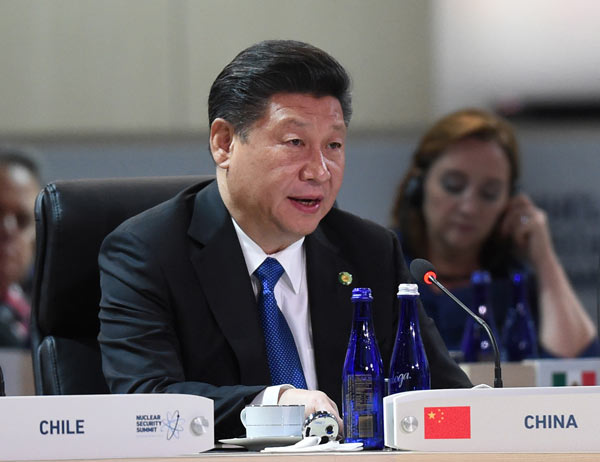 |
|
President Xi Jinping delivers a speech at the opening plenary of the fourth Nuclear Security Summit (NSS) in Washington DC, the United States, on April 1, 2016. Provided to China Daily |
US Republican presidential front-runner Donald Trump told The New York Times two weeks ago that he would be open to Japan and the Republic of Korea having their own atomic arsenals to act as a deterrent to the Democratic People's Republic of Korea.
Japan's government responded to Trump's remarks with a statement that it will stick to its policy of not possessing nuclear weapons.
However, Japan is paradoxical.
The country has more plutonium than any other state that does not have an arsenal of nuclear weapons, and it is widely believed that the country has the raw materials, technology and capital for developing nuclear weapons.
The country returned 331 kilograms of weapons-grade plutonium to the United States in March. The shipment is a tiny portion of Japan's plutonium. It possesses nearly 50 tonnes, most of which comes from the reprocessing of spent nuclear fuel burned in its reactors.
On the 70th anniversary of the dropping of an atomic bomb on Hiroshima, Japanese Prime Minister Shinzo Abe said Japan is determined to make even greater efforts toward realizing a world free of nuclear weapons.
Yet Yusuke Yokobatake, director-general of the Cabinet Legislation Bureau, said at the Upper House Budget Committee on March 18 that he does not believe the Constitution bans the use of any type of nuclear weapon.
In a written reply to opposition lawmakers in Japan's Diet on April 1, Abe's cabinet, endorsed Yokobatake's comment as an affirmation of the Japanese government's stance.
In the address, Abe's cabinet said the war-renouncing Article 9 of the country's Constitution does not necessarily ban Japan from possessing and using nuclear weapons as long as they are restricted to a minimum necessary level. It claimed that Japan "firmly maintains a policy principle that it does not possess nuclear weapons of any type under the three non-nuclear principles".
However, as China's Ambassador for Disarmament Affairs Fu Cong pointed out at a thematic discussion on nuclear disarmament at the first committee of the 70th session of the UN General Assembly in 2015, Japan's current stockpile of nuclear materials far exceeds its legitimate needs.
This weekend Japan has been hosting the G7 foreign ministers' meeting in Hiroshima, the city devastated by the first use of an atomic weapon in 1945. US Sectary of State John Kerry and other G7 foreign ministers are scheduled to visit the city's Peace Memorial Park on Monday.
Japan is trying to arrange a Hiroshima visit for US President Barack Obama when he attends the G7 summit in Shima in the Mie prefecture on May 26 and 27. If he agrees, Obama would be the first US president to visit Hiroshima while in office.
"I want to send a strong message on nuclear disarmament from Hiroshima," Japan's Foreign Minister Fumio Kishida said.
And Japan, which lacks fossil fuels and other natural resources, is entitled to the peaceful use of nuclear energy.
But the Abe administration has expanded its defense role, moving the country away from it purely defensive security policy.
Steve Fetter, a former Obama White House official, once said if other countries perceive a growing Japanese plutonium stockpile as a latent nuclear capability it would contribute to instability in East Asia.
Some political forces in Japan have been clamoring for the country to develop nuclear weapons, claiming that Japan should have nuclear weapons if it wants to be a power that can sway the international politics.
The huge amount of sensitive nuclear materials Japan has accumulated over the years gives rise to grave risks both in terms of nuclear security and nuclear proliferation.
The author is China Daily Tokyo bureau chief. caihong@chinadaily.com.cn

I’ve lived in China for quite a considerable time including my graduate school years, travelled and worked in a few cities and still choose my destination taking into consideration the density of smog or PM2.5 particulate matter in the region.